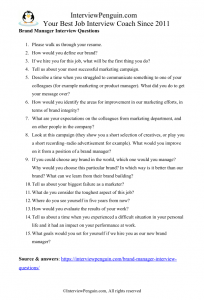Customers are flooded with information. Marketing messages reach them from all directions, 24 hours a day, every day, competing for their attention. They do not want to get drowned, or crazy. And so they try to make a meaning of this mess, but not with the help of their brain, but with their instinct, feelings, emotions, and a deeper wisdom within.
Some messages simply click for them, touch something within, resonate. And they may not even know why. The way a particular company communicates, the sounds and words they use, but also the attitudes and values they present, simply makes sense, makes them attracted to their products and services.
And it is easy to recognize them, because the deep message is consistent across all channels and campaigns. It is their brand.
Brand manager is an amazing job, at least as long as they give you a free hand in the company. You can turn to a little magician who somehow helps them to get all the pieces of the puzzle together. Not by designing new campaigns, or revolutionizing the marketing of the company. You do so by harmonizing everything, and ensuring that their brand (already recognized and loved) speaks from all their campaigns.
Let’s have a look at some questions you may face while interviewing for this great job.
Table of Contents
Please walk us through your resume.
Your sales pitch starts right now, and this is no icebreaker question. You should tell them a story that starts with your passion for branding and marketing.
This passion took you on an intriguing journey, starting with your marketing studies, continuing with interesting creative jobs, and culminating at this point. Now you finally feel ready to guard a strong and interesting brand, the one they have successfully built in the company.
Remember that you are building your personal brand with every word you say in an interview. Is there passion? Is there energy? Can they hear love for your profession in your voice? Keep it on your mind. Many things matter besides the words you use to describe your past experience.
How would you define our brand?
You can hardly maintain a brand integrity unless you understand the brand, the message it tries to convey, the values it presents. So what is their brand?
Maybe they failed in their branding efforts, and the picture is rather blur. But you should do your research anyway. Check their website and look for section labeled as “mission statement” or “our vision“, or “corporate values“.
Try to find something you can praise, try to select two or three words that really stand out (or should stand out) in all their marketing efforts. Define their brand with the words. And if there is no brand at the moment (which can sometimes be the reason why they try to hire a new brand manager), be honest, but criticize with diplomacy.
If we hire you for this job, what will be the first thing you do?
Buy a new Lamborghini, jump on a plane and enjoy an exotic holiday, or take your wife to finally see that big house she wanted to buy so badly.
Maybe you’ll do one of these things (or all of them), but interviewers inquire about things you do on the job, when sitting in your comfy office.
You can say that first and foremost you’ll talk to the leader of the marketing department, and other leading figures from the company. You will try to understand the values, the goals, the message they try to present to the public, and whether they succeed with building their brand.
Once you know what they try to say to the customer and to the public, you can start with your magic. You will look at individual campaigns (including internal communication in the company, and also PR), and will try to add an ingredient of their brand (values) to everything, just in the right quantity and quality for a given campaign and audience.
* May also interest you: What is your favorite brand and why?
Tell us about your most successful marketing campaign.
Brand manager is not an entry level position. You’ve likely gained your share of experiences in marketing already, had a taste of some successes and failures. You’ve seen it all, made some bright moves and also some stupid mistakes.
Now you should showcase your expertise and experience. Work portfolio can definitely help you, because to see something once is better than to hear about it a thousand times. Prepare a collection of your best works and campaigns–it can only help you in an interview.
And remember, the most successful campaign is not the most creative one, or one that bagged you an award from press or from critics. It’s the one that actually over delivered, that helped your former employer (or your client if you worked as a freelancer) to earn a lot of money, or to build their brand–something they are still benefiting from.
Describe a time when you struggled to communicate something to one of your colleagues (for example marketing or product manager). What did you do to get your message over?
This situation will happen a lot in your new job. You will knock on the door of Joe’s office, and tell him: “Hey Joe, listen, your idea for a new campaign sucks. It doesn’t reflect our brand values at all.”
Maybe you will say it in a different way (you should), but the message will be the same. And people do not like to hear such messages.
So, when you refer to a situation from your last job, one when you had to tell someone something they didn’t like at all, ensure the interviewers that you were not discouraged, and did not hesitate. Because you wanted to do the best thing for the company, and it was your duty to protect the integrity of the brand (or something else you responded for).
You can explain that you tried to convey your message in a diplomatic way, one that would not touch them personally, creating some fences between you two, barriers you’d later find hard to overcome.
You can also address something else in your answer, and that’s the situation when someone did not understand you, or your instructions. They weren’t dumb, they just didn’t get your message, or did not understand your professional jargon. Ensure the interviewers that you do not mind stepping out of your comfort zone, simplifying your language, talking in a way your audience can understand.
Special Tip: You can download the full list of questions in a one page long PDF, and practice your interview answers anytime later:

How would you identify the areas for improvement in our marketing efforts, in terms of brand integrity?
This is not always easy to do, but measuring the reaction of the target audience can certainly help. For example, how they react on the promotion of a new product, whether adequate number of purchases follows the campaign (when compared to the numbers similar products with different campaigns achieved before).
Or you can directly question them (in the store, on social media, at random), asking them about the feelings the new campaign induces in them, the thoughts that come into their mind once they hear it or see it. Then you can compare them to the message you try to convey, the message your brand represents (or try to represent).
Or you can simply play them a message without the name of the company, and ask them to identify the brand behind the product. If they fail to identify it, you have some work to do.
What are your expectations on the colleagues from marketing department, and on other people in the company?
You can opt for one of two approaches with this question. First one is saying that you do not really expect anything from anyone. You have high expectations, very high indeed–but on yourself.
Preferring to look at the campaigns from bird perspective, you do not want to be influenced by the descriptions and essays of product managers and marketing managers. You want to look at each their effort and communication without any prejudice or emotional baggage.
Trying to see it as a target customer will, you compare the message of the campaign with the “message” of the brand, and look for improvements. What else the managers do (or don’t do) is of no concern to you. You do not like to gossip and it’s someone else’s responsibility to evaluate their work.
Another approach consist is focusing on open communication. In this case you can say that in your opinion feedback flows freely in all directions in a successful company, and that you expect an open ear and a constructive criticism from your colleagues from the marketing department, or from anyone else in the company.
Look at this campaign (they show you a short selection of creatives, or play you a short recording–radio advertisement for example). What would you improve on it from a position of a brand manager?
Short case study is a best way to see whether you really excel in the job, or can only talk about excelling in it. If you get this task in an interview, first thing you should so is to clearly define the message they try to build with their brand (not with the particular campaign), define it in your head.
If this message isn’t clear to you, you can ask them, or discuss it (additional questions won’t harm you in an interview). Then you should simply identify the areas in which the campaign fails to convey “the message of their brand”. Obviously the exact answer will vary from one interview to another (depending on the campaign they show you).
But it may also be a trick, and the campaign may reflect their brand perfectly. If it is a case, praise them for the excellent job they did with the campaign.
Other questions you may face in your brand manager interview
- If you could choose any brand in the world, which one would you manage? Why would you choose this particular brand? In which way is it better than our brand? What can we learn from their brand building?
- Tell us about your biggest failure as a marketer?
- Tell us about a time when you felt overwhelmed with work.
- What do you consider the toughest aspect of this job?
- Where do you see yourself in five years from now?
- How would you evaluate the results of your work?
- Describe a situation when you missed a deadline.
- Tell us about a time when you experienced a difficult situation in your personal life and it had an impact on your performance at work. How did you get over it?
- What goals would you set for yourself if we hire you as our new brand manager?
- Tell us about a situation when you had to make a decision without all information you needed.
- After everything that has been said in this interview, do you want to ask any questions?
* If you are not sure how to answer the questions from my list, or experience interview anxiety, have a look at our Interview Success Package. Up to 10 premium answers to basically all questions you may face in your brand manager job interview will help you streamline your interview preparation, find the right words in every moment of the interview, outclass your competitors, and eventually get this great job. Thank you for checking it out!
Conclusion, next steps
Interview for a brand manager position belongs to very difficult job interviews. It is a fancy job title that typically attracts dozens (if not hundreds) of applications, and you will compete with many other experienced professionals for the job.
What’s more, hiring managers will test your skills with difficult behavioral and situational questions (I outlined some in the article), short case study (just like the one I described with the marketing campaign), and perhaps also with an IQ test or some other forms of testing.
Well, your situation isn’t easy. But this is an amazing job, and great things are rarely easy to conquer in life. Do as much as you can to prepare for the interviews. Read this article again, and try to prepare a short answer to each question from my list. Check also other online resources, and do a good research about your employer. I wish you good luck!
Matthew
May also help you to prepare for your brand manager interview:
- Social Media Manager interview questions.
- Communication skills interview questions – Communication is everything in this job, and you may get some questions that try to uncover your limitations.
- Brand Ambassador interview questions.


